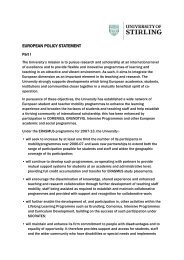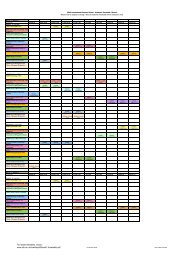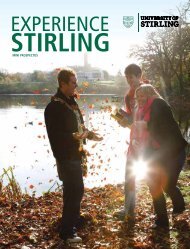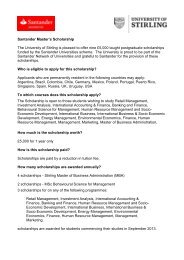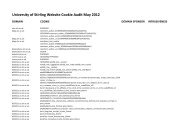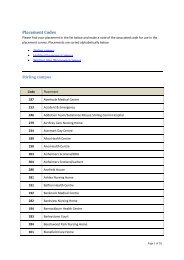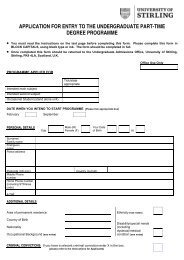Health First: An evidence-based alcohol strategy for the UK
Health First: An evidence-based alcohol strategy for the UK
Health First: An evidence-based alcohol strategy for the UK
Create successful ePaper yourself
Turn your PDF publications into a flip-book with our unique Google optimized e-Paper software.
<strong>Health</strong> <strong>First</strong>: an <strong>evidence</strong>-<strong>based</strong> <strong>alcohol</strong> <strong>strategy</strong> <strong>for</strong> <strong>the</strong> <strong>UK</strong><br />
The sale of <strong>alcohol</strong> in shops<br />
should be restricted to specific<br />
times of <strong>the</strong> day and designated<br />
areas. No <strong>alcohol</strong> promotion<br />
should occur outside <strong>the</strong>se areas.<br />
The law prohibiting <strong>the</strong> sale<br />
of <strong>alcohol</strong> to people who are<br />
already drunk should be actively<br />
en<strong>for</strong>ced.<br />
Wherever <strong>alcohol</strong> is sold, a soft<br />
drink should be available that<br />
is cheaper than <strong>the</strong> cheapest<br />
<strong>alcohol</strong>ic drink on sale.<br />
Local authorities should use local<br />
byelaws to improve community<br />
safety by creating <strong>alcohol</strong>-free<br />
public spaces where <strong>alcohol</strong><br />
consumption is prohibited.<br />
Drink driving measures<br />
The legal limit <strong>for</strong> blood <strong>alcohol</strong><br />
concentration <strong>for</strong> drivers should<br />
be reduced to 50mg/100ml.<br />
Random breath-testing of drivers<br />
should be introduced.<br />
Early intervention and treatment<br />
All health and social care<br />
professionals should be trained<br />
to routinely provide early<br />
identification and brief <strong>alcohol</strong><br />
advice to <strong>the</strong>ir clients.<br />
In Scotland, shops can be licensed to sell <strong>alcohol</strong> <strong>for</strong> a maximum of 12 hours, from<br />
10am to 10pm. There is a presumption against 24-hour <strong>alcohol</strong> sales. Off-sales<br />
<strong>alcohol</strong> can only be displayed in a single area of a premises and drink promotions<br />
can only take place within <strong>the</strong> <strong>alcohol</strong> display area.<br />
In Nor<strong>the</strong>rn Ireland, a consultation launched by <strong>the</strong> Minister <strong>for</strong> Social Development<br />
proposes restrictions on <strong>the</strong> availability of <strong>alcohol</strong> in supermarkets, increased<br />
separation between <strong>alcohol</strong>ic and o<strong>the</strong>r goods in supermarkets and a prohibition on<br />
children under 18 years of age entering any area where <strong>alcohol</strong> is displayed.<br />
In England and Wales, no restrictions of this kind exist.<br />
Existing <strong>UK</strong> laws prohibiting <strong>the</strong> sale of <strong>alcohol</strong> to people who are drunk (such as<br />
s141 of <strong>the</strong> Licensing Act 2003) are inadequately en<strong>for</strong>ced.<br />
The mandatory code of <strong>the</strong> Licensing Act 2003 requires on-licensed premises to<br />
provide free tap water on request but <strong>the</strong>re are no requirements regarding <strong>the</strong> price<br />
or availability of soft drinks.<br />
Designated areas where <strong>alcohol</strong> consumption is controlled or prohibited have a long<br />
history across <strong>the</strong> <strong>UK</strong>. The Criminal Justice and Police Act 2001 provided a national<br />
framework <strong>for</strong> ‘controlled drinking zones’ (CDZs) and over 700 CDZs have been<br />
introduced since 2003 in England. These have been used most effectively in relation<br />
to problematic street-drinking ra<strong>the</strong>r than to address problems in <strong>the</strong> town centres<br />
and <strong>the</strong> night-time economy. A range of o<strong>the</strong>r powers, such as Dispersal Zones,<br />
Penalty Notices <strong>for</strong> Disorder and Drinking Banning Orders, are also available to police<br />
and councils, but <strong>the</strong>se are not applied consistently.<br />
Scotland consulted in <strong>the</strong> autumn of 2012 on lowering <strong>the</strong> drink-drive limits from<br />
80mg/100ml to 50mg/100ml. The measure has cross-party support. The power to<br />
prescribe <strong>the</strong> drink-driving limits in Scotland was devolved to <strong>the</strong> Scottish Parliament<br />
in <strong>the</strong> Scotland Act 2012.<br />
In Nor<strong>the</strong>rn Ireland, a consultation to lower <strong>the</strong> drink driving limit to 50mg/100ml<br />
<strong>for</strong> drivers and 20mg/100ml <strong>for</strong> novice, learner and professional drivers closed in<br />
late 2012 and <strong>the</strong> outcome is awaited.<br />
The Scottish Government is currently seeking <strong>the</strong> power from Westminster to<br />
introduce random breath testing.<br />
In Nor<strong>the</strong>rn Ireland, <strong>the</strong> consultation on drink driving limits also includes proposals<br />
to introduce random breath testing.<br />
In Scotland, a national health improvement target has been in place since 2008 <strong>for</strong><br />
<strong>the</strong> delivery of <strong>alcohol</strong> brief interventions (ABIs). Since <strong>the</strong>n over 272,000 ABIs have<br />
been delivered in primary care, A&E and antenatal care. Fur<strong>the</strong>r targets <strong>for</strong> 2012-<br />
2013 are in place to sustain and embed <strong>the</strong> delivery of ABIs in Scotland.<br />
The Welsh Government has commissioned Public <strong>Health</strong> Wales to train professionals<br />
in ABI. Since 2010, 550 GPs and 1,500 o<strong>the</strong>r professionals have been trained.<br />
There is no comparable initiative to support <strong>the</strong> wider use of ABIs in England. In<br />
2012, <strong>the</strong> government’s Alcohol Strategy signalled that an <strong>alcohol</strong> check would be<br />
introduced into <strong>the</strong> NHS <strong>Health</strong> Check <strong>for</strong> adults aged 40-75 from April 2013. The<br />
Department of <strong>Health</strong> is considering whe<strong>the</strong>r <strong>the</strong> Quality and Outcomes Framework<br />
can support GPs to carry out ABIs. Local authorities will be encouraged ‘to examine<br />
<strong>the</strong> strong case <strong>for</strong> fur<strong>the</strong>r local investment’ in ABIs in primary care.<br />
In Nor<strong>the</strong>rn Ireland, <strong>the</strong> <strong>Health</strong> and Social Care Board launched a regional enhanced<br />
service in 2012 <strong>for</strong> <strong>alcohol</strong> screening and brief interventions within primary care.<br />
47





